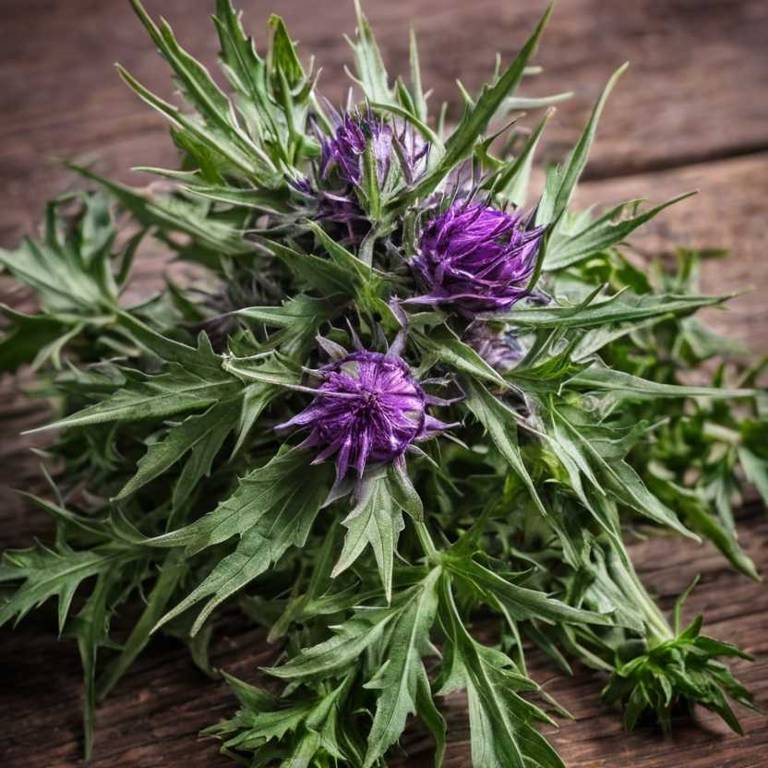By Leen Randell
Updated: Jul 20, 2024
10 Medicinal Constituents Of Silybum Marianum (Milk Thistle)

Silybum marianum has active constituents such as silymarin, flavonoids, and silibinin.
These constituents exhibit hepatoprotective, antioxidant, and anti-inflammatory properties, making it beneficial for liver health. Silymarin, in particular, can improve liver function in individuals with liver disease, while flavonoids and silibinin may also have antiviral and anti-cancer effects. Improved liver health can enhance overall well-being and quality of life.
Regular use of milk thistle may also help to mitigate the side effects of certain medications.
This article explains in details the 10 best active constituents of Silybum marianum.
1. Silymarin
Silybum marianum silymarin is a bioflavonoid complex extracted from the seeds of the plant.
It has been used for centuries to treat liver and gallbladder disorders due to its ability to protect against liver damage and inflammation.
Silymarin has antioxidant and anti-inflammatory properties, making it an effective natural remedy for various health conditions, including cirrhosis, hepatitis, and even cancer treatment side effects.
2. Silibinin
Silybum marianum silibinin is a bioactive flavonoid lignan extracted from the seeds of this plant.
It has been traditionally used for centuries to treat liver and gallbladder disorders due to its potent antioxidant and anti-inflammatory properties.
Silibinin has been shown to protect against oxidative stress, apoptosis, and cell damage, making it a potential therapeutic agent for various diseases, including cancer, diabetes, and neurodegenerative disorders.
3. Isosilibinin
Silybum marianum isosilibinin is a flavonoid compound that is extracted from the seeds of the plant.
It has been shown to have antioxidant and anti-inflammatory properties, making it a popular ingredient in herbal remedies for liver disease and other health conditions.
Isosilibinin has been found to possess strong free radical scavenging activity, which can help protect cells from damage caused by oxidative stress.
4. Silichristin
Silybum marianum silichristin is a bioflavonoid compound extracted from its seeds.
It has been traditionally used to support liver health and protect against liver damage caused by toxins and medications.
Silichristin has been shown to exhibit antioxidant and anti-inflammatory properties, which may help in the prevention of chronic diseases such as cancer, cardiovascular disease, and neurodegenerative disorders.
5. Silycysteine
Silybum marianum silycysteine is a bioactive flavonoid compound extracted from the plant's seeds.
It has been traditionally used to treat liver and gallbladder disorders due to its potent hepatoprotective properties.
Silycysteine has been shown to possess antioxidant, anti-inflammatory, and anti-fibrotic activities, which contribute to its therapeutic potential in preventing or reversing liver damage caused by toxic substances, viruses, and other factors.
6. Coniferin
Silybum marianum coniferin is a bioactive compound found in the seeds of this plant.
Coniferin is a unique triterpenoid saponin that has been shown to possess various biological activities, including antioxidant, anti-inflammatory, and immunomodulatory effects. It has also been reported to exhibit anticancer properties by inhibiting the growth of cancer cells and inducing apoptosis.
Additionally, coniferin has been studied for its potential benefits in treating liver diseases and protecting against oxidative stress-induced damage.
7. Silandrin
Silybum marianum silandrin is a bioflavonoid that is extracted from the seeds of the plant.
It has been used for centuries to support liver health and protect against liver damage caused by toxins.
Silandrin has antioxidant and anti-inflammatory properties, which help to reduce oxidative stress and inflammation in the body, making it a popular natural remedy for various health conditions, including liver disease, cancer, and digestive issues.
8. Silydianin
Silybum marianum silydianin is a flavonoid compound extracted from its seeds.
This bioactive molecule has been extensively studied for its potential health benefits, including antioxidant and anti-inflammatory properties. Silydianin has been shown to have protective effects on the liver and kidneys, and may help prevent damage caused by oxidative stress and inflammation.
Additionally, it may also exhibit immunomodulatory activities, making it a promising compound for various therapeutic applications.
9. Choline
Silybum marianum choline is a naturally occurring compound found in its seeds.
It has been traditionally used to support liver health and detoxification processes by protecting the liver from damage caused by free radicals and toxins.
Choline from milk thistle has also been shown to have antioxidant and anti-inflammatory properties, making it a potential natural remedy for various health conditions, including liver diseases, digestive issues, and skin problems.
10. Phytosterols
Silybum marianum phytosterols is a unique compound found in its seeds.
Phytosterols are plant-based steroids that have been shown to exhibit numerous health benefits, including lowering cholesterol levels and improving liver function. They have also been found to have anti-inflammatory properties and may help protect against certain diseases such as cancer and heart disease.
Additionally, phytosterols have been shown to be effective in reducing the risk of cardiovascular disease by inhibiting the absorption of dietary cholesterol.